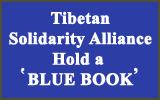UN Experts Express Concern Over Extensive Labour Exploitation in Tibet by China

A group of six UN experts issued a joint communication to the Chinese government expressing their deep concerns over serious violations of human rights in Tibet particularly relating to extensive labour exploitations. The communication (AL CHN 14/2022) dated 6 February 2023 was just made public as per established confidentiality procedures of the communication to the state.
The group of UN experts have asked China to “clarify” the concerning situation of Tibetans, especially subjecting of Tibetans to extensive labour exploitation which may amount to forced labour, trafficking for purpose of forced labour, marginalization of the Tibetan language, religion, way of life and forced political indoctrination of prisoners, violations of freedoms of thought, conscience, opinion and expression in Tibet. The experts also expressed “acute concern” over the conditions under which the re-education of Tibetans takes place in Tibet.
In the joint communication sent to China by the UN experts, the experts stressed the “extensive labour transfer program in the Tibetan Autonomous Region, placing rural workers into low-skilled and low-paid industrial jobs, allegedly eroding Tibetan minority languages, cultural practices, and religion”. The communication notes that the Chinese government has itself corroborated that “from 2015 to 2020, over 2.8 million farmers and herdsmen in Tibet were ‘transferred’ from the agricultural sector to the manufacturing and services sectors in urban areas, including over 600,000 transfers in 2020 alone.”
UN experts called upon China to provide information about, inter alia, labour transfer programme, such as number and locations of existing forced labour transfer facilities in Tibet; disaggregated statistics on the number of ethnic Tibetans transferred through the labour transfer programmes; businesses based in so-called Tibet Autonomous Region; use and teaching of Tibetan language, including restriction placed on usage of Tibetan language, “benefits” for Tibetans who are transferred to low-paid, low skilled jobs, such as construction or textile manufacturing. Furthermore, China has been asked to reveal information on the grid management control system, in the name of social stability, in Tibet.
Welcoming the joint communication, Representative Thinlay Chukki of the Tibet Bureau Geneva thanked the experts for taking note of dismal situation of Tibetans under China, and urged the government of China to “respect and uphold the established procedures of UN communication by submitting detailed information concerning the serious human rights violations perpetrated by China in Tibet, including extensive forced labour transfer programs and erosion of Tibetan language, along with long list of rights violations in Tibet.”
The group of six UN experts who have issued the communication include Special Rapporteur on contemporary forms of slavery, including its causes and consequences Tomoya Obokata; Special Rapporteur in the field of cultural rights Alexandra Xanthaki; Special Rapporteur on the right to development Saad Alfarargi; Special Rapporteur on minority issues Fernand de Varennes; Special Rapporteur on contemporary forms of racism, racial discrimination, xenophobia and related intolerance K.P. Ashwini and Special Rapporteur on trafficking in persons, especially women and children Siobhán Mullally.
The communication can be read here.




